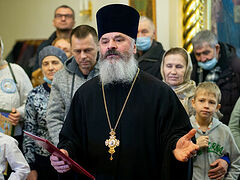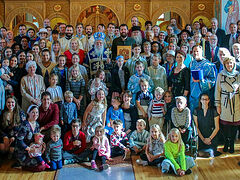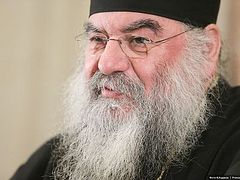Who then is Paul, and who is Apollos,
but ministers by whom ye believed,
even as the Lord gave to every man? (1 Cor. 3:5).
Who are we? We are servants, helpers of God, and we do God’s work: I have planted, Apollos watered; but God gave the increase (1 Cor. 3:6).
It’s not us people who do God’s work, but Him. We people are simple, weak, insignificant, and we’ve been given a concrete ministry: The Lord has appointed us to serve in the Church—to confess people, to preach the word of God, to celebrate the Sacred Mysteries. This means we’re only humble servants of the Church, and God does everything—we should know this and not resist it, because our resistance is spiritual infancy.
The Church isn’t a human institution where everything depends on the quality of work of its ministers. There was a successful store owner who decided to hand over his business to his children, and so he started teaching them the finer points of the business. For example, so that there would always be customers coming to the store, he instructed:
“When someone comes, treat him. Offer to him: ‘Would you like a glass of lemonade?’ Treat him to some loukoumi, some raki, or wine. Give him a gift!”
But this is how his children reacted:
“If the customer wants to buy something, he’ll buy it without any treats. And if he wants to drink wine, let him go to the tavern across the street.”
That’s how they reasoned. And half a year later, the store was empty. No one was coming. The father took matters back into his own hands and again started attracting people with raki and wine, treating them with loukoumi, and customers returned. Were the Church a human institution, then it would be good to go where there are attentive clergy, but the Church rests not upon the righteousness of its ministers, but on the grace of God. Two priests in different churches serve the Divine Liturgy, but both Liturgies have the same power, regardless of whether a righteous or sinful priest served it.
God works in Church life, and we should feel like children of the Church of Christ, not of certain people, even if we can’t do without them: our spiritual fathers, mentors, confessors, from whom we receive spiritual benefit and who strengthen us.
Sometimes the faith with which we approach someone matters. A confessor may be a righteous person, but if we come to him with unbelief, we won’t receive any spiritual benefit from him. And conversely, the confessor might be a sinful person, but if you approach him with faith, you’ll receive an answer from the Holy Spirit.
I’ll tell you a story that happened on Mt. Athos.
Many people would come to see Elder Paisios. We were living at Koutloumousiou Monastery for a while then. Signs were put up saying: “To Elder Paisios’ cell,” and the path would lead you to him. But pilgrims often got lost and wound up at the cells of other monks. They would knock at the door and ask:
“Is this where Elder Paisios lives?”
“No.”
“Where then?”
“His cell’s farther down the path.”
A monk comes to his cell, he wants to rest, to do some spiritual work, to pray, and here comes another pilgrim knocking at the door and asking:
“Is this Elder Paisios’ cell?”
“No, it’s not his cell.”
“How can I find it?”
“Go along this path and it’ll lead you to the Elder.”
This happened a hundred times a day. Many monks were indignant. Deacon Nikon lived here too, already quite elderly—I think he was eighty, and much taller than me… He was a happy, wonderful man. His cell was the first where the lost pilgrims would knock—it was halfway to Elder Paisios. At some point he too got tired of it, and when the next pilgrims came, he said:
“This is his cell, my children. I’m Elder Paisios!”
And, well, they believed him.
“Bless, Geronda!”
The pilgrims gathered around, and Deacon Nikon sat down in the middle and started prophesying, revealing thoughts, and telling various spiritual stories. They were delighted, inspired. He treated them, gave them various little things, and joked with them. He loved to joke.
Then the people returned to the monastery, earlier than usual. I asked them:
“Well, how was it with Elder Paisios?”
“Oh, Father, we found his cell right away!”
“Wonderful! But the path to the Elder’s place takes half an hour there and half an hour back.”
“How long were we gone?”
“Half an hour.”
“But we saw Elder Paisios!”
Lord, have mercy!
“Good, and you spoke with him?”
“Yes, we did! Oh! Everything we wanted to know, we found out! He told us about the life of each one of us! How wise he is! A precious man!”
And then the child who was with them said:
“Only, he’s too fat.”
“Fat?! Elder Paisios—fat?!” I marveled. “He’s thin as a rail!”
“Father, he’s very fat! Too fat. His stomach starts right from his neck,” the child said.
“Hmm, something’s not right here,” I said to myself.
“Okay, go rest, and we’ll talk tomorrow.”
And I sent them to the guest house, and I myself dashed off to see Deacon Nikon.
“Fr. Nikon!”
“I’m listening.”
“Did a group of young people come see you—about twenty people maybe?”
“Yes, they did.”
“And what happened?”
“One of the guys asked me: ‘Where’s Elder Paisios live? How can we find him?’ And I said: ‘I’m Paisios. Ask me what you want.’ I sat and started prophesying, revealing thoughts. I talked about everything they were interested in hearing about.”
“Well, you blessed man, what have you done?!”
I left Deacon Nikon’s cell and headed for Elder Paisios.
“If only you knew what happened today!”
And I told him the whole story. Elder Paisios burst out laughing.
“Well, my child, what a good man our Deacon Nikon is! He delivered me from the headache I probably would’ve had with these young people!”
After all, the old man really did talk with them about God, because they had faith. Elder Nikon was inspired and truly told them important spiritual things, without being a prophet. He came to Mt. Athos in his childhood. He was a humble, very good, wonderful man. And he was also overweight. Yes, we are fat people, not skinny. Don’t look at the saints, who were thin: They were thin, but they were saints!
One psychiatrist explained this to me and I stopped worrying about it. He asked me:
“Father, do you know why many priests are fat?”
I said: “Probably because we don’t move around much.”
“No, Father! It’s because you’re calm people. A calm man doesn’t get angry or nervous—and he gets fat. But we get nervous and angry all day long… How can we gain weight?!”
I told him:
“You’re right. Thank God, we get nervous once every two or three months!”
So that’s that. So we had a good laugh today, and then the day before yesterday this one woman called from Athens and told me:
“Father, I listen to your talks. They’re so good. You can’t imagine how I laugh when I listen to you!”
I told her:
“You’re right!”
They’re only good for a laugh, and nothing else.




